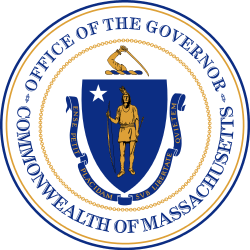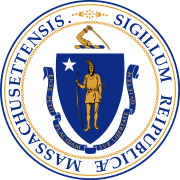Frank G. Allen
| Frank G. Allen | |
|---|---|
 | |
| 51st Governor of Massachusetts | |
|
In office January 3, 1929 – January 8, 1931 | |
| Lieutenant | William S. Youngman |
| Preceded by | Alvan T. Fuller |
| Succeeded by | Joseph B. Ely |
| 49th Lieutenant Governor of Massachusetts | |
|
In office January 8, 1925 – January 3, 1929 | |
| Governor | Alvan T. Fuller |
| Preceded by | Alvan T. Fuller |
| Succeeded by | William S. Youngman |
| President of the Massachusetts Senate | |
|
In office 1921–1924 | |
| Preceded by | Edwin T. McKnight |
| Succeeded by | Wellington Wells |
| Member of the Massachusetts Senate Norfolk Senatorial District | |
|
In office 1921–1924 | |
| Member of The Massachusetts House of Representatives 8th Norfolk District | |
|
In office January 1918 – January 1920 | |
| Chairman of the Norwood, Massachusetts Board of Selectmen | |
|
In office 1914–1919 | |
| Chairman of the Norwood, Massachusetts Board of Assessors | |
|
In office 1909–1913 | |
| Personal details | |
| Born |
October 6, 1874 Lynn, Massachusetts |
| Died |
October 9, 1950 (aged 76) Norwood, Massachusetts |
| Political party | Republican |
| Profession | Leather and Wool merchant |
| Religion | Congregationalist |
Frank Gilman Allen (October 6, 1874 – October 9, 1950) was a businessman and politician from Massachusetts. He was president of a successful leathergoods business in Norwood, Massachusetts, and active in local and state politics. A Republican, he served two terms as Lieutenant Governor, and then one as the 51st Governor of Massachusetts. During his term, the Massachusetts Transit Authority (now the Massachusetts Bay Transportation Authority) was founded.
Biography
Allen was born in Lynn, Massachusetts, on October 6, 1874, and was educated in local schools. Although he won admission to Harvard University, he lacked the funds to attend, and instead began working Lynn's shoe industry. He later moved to Norwood, where he rose to become president of the Winslow Brothers & Smith Company, a position he held from 1912 to 1929. He married Clara Winslow in 1897.
Allen entered public service as a member of the Norwood Board of Assessors from 1910 to 1915 and as a Norwood Town Selectman from 1915 to 1922. During that period, he also served in the Massachusetts House of Representatives from 1918 to 1919, and in the Massachusetts Senate from 1921 to 1924. In 1924, he was elected Lieutenant Governor of Massachusetts, having defeated the Democratic ticket of James Michael Curley and runningmate James Henry Brennan with fellow Republican Governor Alvan T. Fuller. Fuller and Allen served two terms, after which Allen succeeded Fuller as governor, and served until 1931.
During the administration of Governor Allen, he established the Massachusetts Transit Authority (now the Massachusetts Bay Transportation Authority), the Massachusetts Port Authority, and the state's Industrial Commission. He expanded facilities to care for the sick and the indigent, and in an unusual move for the times, appointed two women to judgeships in Massachusetts. He also signed the bill granting the Eastern Nazarene College the power to grant degrees in Massachusetts on March 12, 1930, after the school defended its petition before the General Court.[1]
In 1930, Governor Allen was defeated for re-election by Democrat Joseph B. Ely, and returned to the Winslow Brothers & Smith Company, where he served as Chairman of the Board until his death.
Allen died in 1950, and is buried in Norwood's Highland Cemetery. He was survived by his second wife, Eleanor Wallace Allen, a son, and two daughters.
Notes and references
- ↑ Cameron, James R. (1968). Eastern Nazarene College—The First Fifty Years, 1900-1950. Kansas City: Nazarene Publishing House. pp. 194–195.
| Political offices | ||
|---|---|---|
| Preceded by Alvan T. Fuller |
Lieutenant Governor of Massachusetts 1925–1929 |
Succeeded by William S. Youngman |
| Preceded by Alvan T. Fuller |
Governor of Massachusetts 1929–1931 |
Succeeded by Joseph B. Ely |

